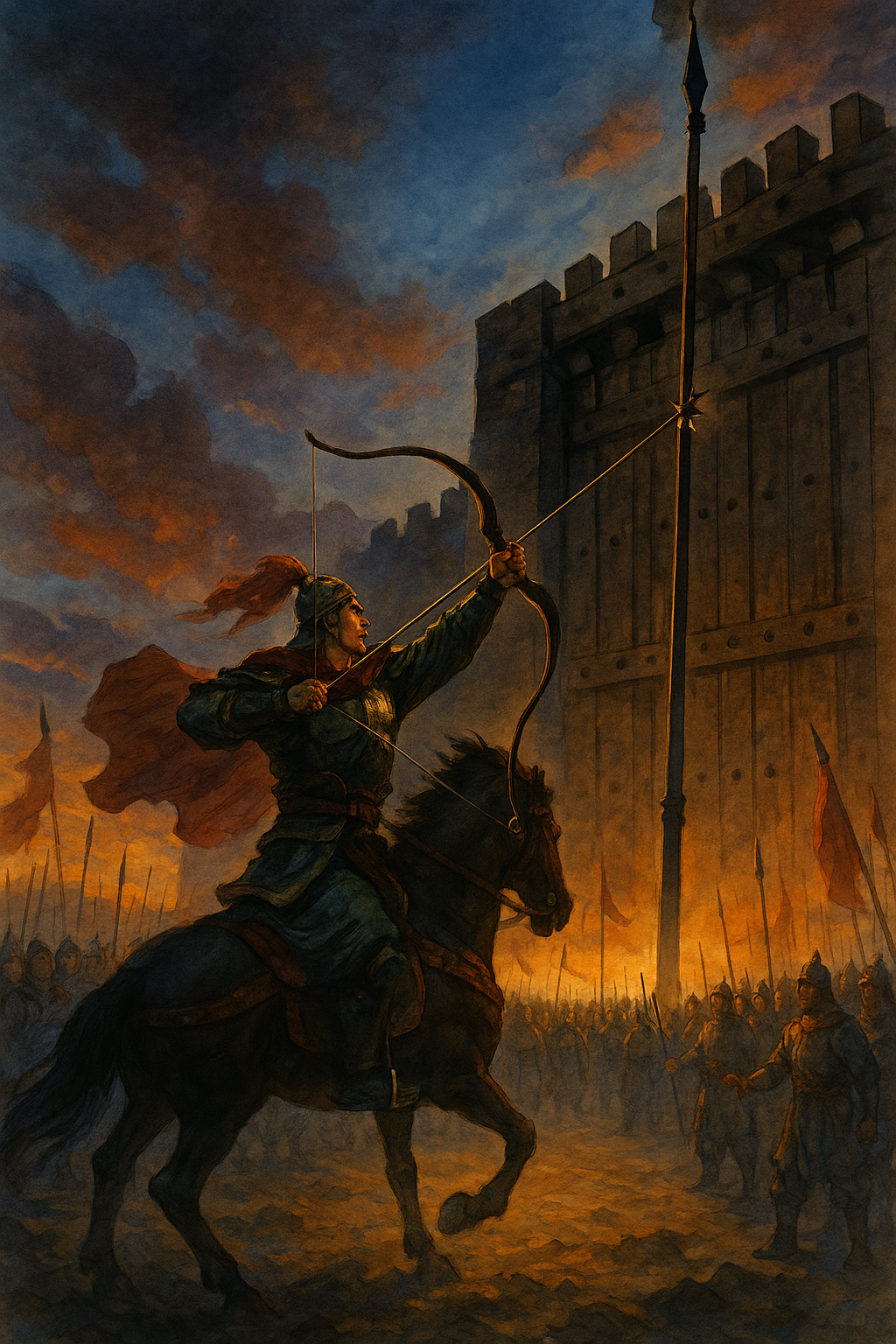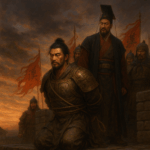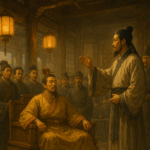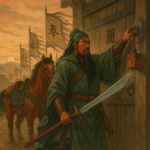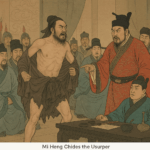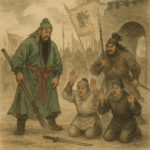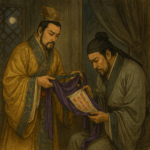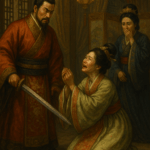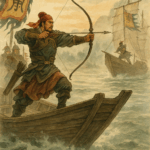Yáng Dàjiàng (General Yang) proposed to attack Liu Bei. Yuan Shu asked, “What’s your plan?” Yang Dàjiàng replied, “Liu Bei’s camp at Xiaopei is vulnerable—yet Lü Bu sits like a tiger in Xuzhou. We once sent him gold, grain, horses, and silk, but he has not delivered. He may aid Liu Bei unless we secure his loyalty. Send him provisions now under pretense of friendship; once he stands idle, we can seize Liu Bei. Then, having captured Liu Bei, we turn on Lü Bu and win all Xuzhou.” Yuan Shu approved, loaded twenty thousand dàn (斛) of grain onto carts, and dispatched Hán Yìn with a secret letter to Lü Bu.
Lü Bu greeted Hán Yìn with great honor. Returning to Shouchun, Hán Yìn reported the warm reception, and Yuan Shu raised an army under Jì Líng as commander, with Léi Bó and Chén Lán as deputies, marching tens of thousands on Xiaopei. Liu Bei, hearing this, convened his officers. Zhang Fei begged to lead the defense, but Sūn Qián warned, “Our men and provisions are too few—better to send for Lü Bu’s aid.” Zhang Fei snorted, “Lü Bu will never come!” Yet Liu Bei sided with Sūn Qián, and drafted a plea to Lü Bu:
“Your Excellency has ever shown gracious care for me at Xiaopei, my refuge under Heaven’s mandate. Now Yuan Shu, nursing old hatred, dispatches Jì Líng’s army at our gates—we face destruction at dawn. Only Your Excellency can save us. Please lead a force to relieve our peril; we shall be forever grateful.”
Lü Bu read the letter and conferred with Chén Gōng: “Yuan Shu’s gift of provisions was meant to bind me so I would not aid Liu Bei. Now Liu Bei again appeals for rescue. Xiaopei is small—if Yuan Shu conquers it, the lords of Mount Tai will unite against me, and I cannot slumber in peace. Better to save Liu Bei now.” He mustered his troops and marched west.
Meanwhile Jì Líng had pushed to the southeast of Pei County and set camp, riotously flaunting banners by day and drumming by night. Liu Bei mustered barely five thousand and reluctantly arrayed for battle. Word came that Lü Bu’s host was only a li away to the southwest. Realizing Lü Bu had come to his aid, Jì Líng hastily sent word rebuking the betrayal. Lü Bu laughed, “I have a plan that will leave neither Yuan Shu nor Liu Bei resentful.” He summoned both camps to a banquet. Hearing the invitation, Liu Bei insisted on going; Guan Yu and Zhang Fei warned him of treachery, but he trusted Lü Bu’s goodwill. All three rode to Lü Bu’s camp.
When Liu Bei and Zhang Fei arrived, Lü Bu embraced Liu Bei: “I have come to lift your peril; when fortune favors us, let us not forget this bond!” He invited them to sit as Jì Líng approached. Startled, Jì Líng turned to flee, but Lü Bu caught him like a child. “Do you think I intend to kill you?” Lü Bu asked. “Or to harm Dàr Ěr?” Jì Líng shook his head. Lü Bu explained, “Liu Bei and I are sworn brothers; when you besieged him, I came to his aid. Now I shall end your feud.” Jì Líng asked, “How?” Lü Bu replied, “By Heaven’s decree.” He seated Liu Bei on his right, Jì Líng on his left, and ordered a banquet.
After several rounds of wine, Lü Bu stood and announced, “On my honor, both armies must lay down arms.” Liu Bei fell silent. Jì Líng protested, “My orders were from Lord Yuan: I am here to capture Liu Bei!” Zhang Fei sprang up, sword drawn: “Though few, we are no toy soldiers! You dare threaten my brother!” Guan Yu held him back. “Let us hear Lü Bu’s terms first,” he urged.
Enraged, Lü Bu drew his halberd and planted it outside the gate—one hundred fifty steps from the center of camp. “If I shoot a single twig, both armies must disarm. If I miss, each returns to their camps and resumes combat. Whoever disobeys is my enemy.” Both commanders agreed. Lü Bu poured more wine, then seized his recurve bow. “Watch and marvel,” he said. Drawing back the string, he let fly:
From taut bow the bright moon seemed to sail,
An arrow sped like a falling star—
It struck the painted bit of halberd’s rail,
And at the shot all men let loose their war.
At Lü Bu’s laughter and the crack that split the halberd’s branch, both camps cheered. He turned to Liu Bei and Jì Líng, clasped their hands, and ordered more wine. Shamefaced, Liu Bei drank deeply; Jì Líng nodded in approval and returned to camp at once.
That night Jì Líng reached Shouchun and told Yuan Shu how Lü Bu had nullified the alliance with one arrow. Yuan Shu fumed, “He accepted our provisions, then mocked us to defend Liu Bei! I will lead my own host to crush both Liu Bei and Lü Bu!” Jì Líng advised caution: “Lü Bu is mighty and holds Xuzhou. If he and Liu Bei join forces, we cannot prevail. Rather, we must sow distrust between them.” He proposed a marriage alliance: send an emissary with lavish gifts to Lü Bu, asking for his daughter’s hand in marriage to Yuan Shu’s son. Yuan Shu agreed and dispatched Hán Yìn once more.
Hán Yìn arrived at Xuzhou with betrothal gifts. Lü Bu welcomed him courteously and prepared the bride’s chamber. Early the next morning, Chén Gōng entered the guest hall and dismissed servants. “Who devised this match between Yuan Shu and Lü Bu?” he demanded. Hán Yìn pleaded secrecy. Chén Gōng warned, “Delay is fatal—send her at once to Shouchun under cover of night, marry quickly, and no rival can interfere.” Lü Bu heeded him, arranged the bridal carriage, and dispatched the princess with Hán Yìn, escorted by Sòng Xiàn and Wèi Xù under festive fanfare.
At dawn, Chén Yuánlóng’s father, Chén Guī—elderly and ailing—heard the procession’s drums and recognized the ruse. “This is the ‘divide-by-marriage’ stratagem,” he said, and hobbled to Xuzhou. In Lü Bu’s presence he cried, “General, you are deceived! Yuan Shu first bound you with gifts so you would not aid Liu Bei—whom you saved with your arrow. Now he would hold your daughter hostage, then attack Xiaopei. If you obey, you will overextend and earn enemies; if you refuse, you break your word. Moreover, Yuan Shu plots to call himself emperor. You will be complicit in rebellion!”
Horrified, Lü Bu ordered Zhang Liao to ride behind the procession and seize his daughter back before they left the city walls. Hán Yìn was arrested; Lü Bu sent him under guard back to Yuan Shu, feigning delay of the bride’s trousseau.
That same dawn Lü Bu learned Liu Bei was recruiting new troops at Xiaopei. Furious at the theft of his fine horses by Zhang Fei, he raised his banner and marched there. Liu Bei, hearing this, rode out to meet him. At Pei’s gate, Lü Bu charged, “I saved your life at the gate—why steal my horses?” Liu Bei replied, “We urgently pressed all markets for mounts—how could I foresee that they were yours?”
Lü Bu spat curses: “So you steal my horses yet feign innocence?” Zhang Fei spurred forward, “I stole them—what of it? You seized my city without word!” Sparks flew as Lü Bu with halberd met Zhang Fei’s spear in a furious melee of over one hundred exchanges. Liu Bei, fearing disaster, beat the drum to recall troops.
Lü Bu deployed four wings to surround Xiaopei. Liu Bei chastised Zhang Fei, “Your whim has brought this upon us—where are the horses now?” Zhang Fei shrugged: “Hidden in various temples.” Liu Bei bowed to Lü Bu’s camp, offered formal apologies, and promised to return the horses in full—and the armies withdrew.
But Chén Gōng hissed, “If you spare Liu Bei now, he will surely turn on you.” Lü Bu, swayed, resumed the siege. Liu Bei and Mi Zhu counseled flight: “Cao Cao loathes Lü Bu. Let us abandon the city for Xuchang, seek his aid, and with his armies crush Lü Bu—that is the surest path.” Zhang Fei volunteered for the vanguard; Liu Bei formed his columns: Zhang Fei in front, Guan Yu at the rear, Liu Bei in the center to protect the family. Under the full moon, they slipped out northward through the gate. Zhang Fei’s vanguard fought through Sòng Xiàn and Wèi Xù’s pickets, then Zhang Liao intercepted them—but Guan Yu held him off. Realizing Liu Bei was gone, Lü Bu withdrew his own camp to land his citizens at Xiaopei in peace, leaving Gāo Shùn to garrison it, and returned to Xuzhou.
Cao Cao’s Defeat at the Yu River
Liu Bei rode hard to Xuchang and sent Sūn Qián to Cao Cao’s camp with word of pursuit. Cao Cao greeted him warmly: “Liu Bei is like a brother to me.” Next morning Liu Bei, Mi Zhu, and Sūn Qián escorted the Emperor to meet Cao Cao, who entertained them as honored guests. Liu Bei recounted his escape from Lü Bu. Cao Cao declared, “Lü Bu is faithless—together we shall dispatch him.” He feasted Liu Bei that night and saw him off at dawn.
When Xun Yú urged immediate attack on Lü Bu, Cao Cao demurred. He first dispatched envoys to Xuzhou to reconcile Lü Bu and Liu Bei, offering honors and gifts. Then he raised an army of 150 thousand and personally led it with Xiahou Dun as vanguard. They camped by the Yú River. Jia Xǔ urged Zhang Xiù—the nephew of the late rebel leader Zhang Jì—to surrender. Xiù yielded, sending Jia Xǔ into Cao Cao’s ranks. Cao Cao valued his intellect and spared him. Xiù brought his troops into camp, and Cao Cao’s forces garrisoned Wǎn Chéng, forming lines over ten li. After several days Xiù hosted feasts for Cao Cao.
One night, Cao Cao lay drunk in his pavilion and asked if there were any palace entertainers on duty. His nephew Cāo Ānmín whispered that Zhang Xiù’s wife, Zhōu Shì, was famed for her beauty. Cao Cao ordered her brought to camp. She greeted him with courtesy; he pledged to spare Zhang Xiù’s clan and took her as consort. That night they lay together in his pavilion. The next day he moved her outside the camp, stationing Dian Wei as guard—and spent many nights in her company.
Zhang Xiù’s household informed him. Enraged, he plotted with Jia Xǔ. “Tomorrow, wait for Cao Cao to fall into stupor, then kill him,” Jia Xǔ advised. The next day, Cao Cao, intoxicated, granted Zhang Xiù’s request to move his troops into the imperial camp. Xiù divided his men into four outworks and set the date for revolt. Fearing Dian Wei’s valor, he recruited Hú Chē’er—an eight-hundred-pound strongman—to ambush the gate guard and steal Dian Wei’s twin halberds.
That night, as Cao Cao and Zhōu Shì drank, sentries reported enemy horses outside—a routine patrol. Soon bonfires blazed as the rebel army struck. Cao Cao called for Dian Wei, but the drunken guard could not be roused; his halberds were missing. The rebels surged through the main gate. Dian Wei, waking, grabbed a sword and fought valiantly—killing over twenty foes with his fists when his blade shattered. Surrounded and wounded by dozens of spears, he died at his post.
Barely alive, Cao Cao mounted his horse and fled with Cāo Ānmín on foot behind him. Arrows struck his right arm; his horse went lame at the river’s edge and fell dead under him. Cāo Ānmín was cut down. Cao Cao pressed forward on foot until he seized another rider’s mount. His eldest son Cāo Áng gave him his horse—only to be struck by stray arrows and killed. Cao Cao escaped with ragged remnants of his force. Hearing of Dìan Wei’s fall and of Cāo Méngde’s losses, his officers rallied local militias to his cause. Xiān Yán led the disorganized Qingzhou troops in pillage; Yu Jìn killed dissenters and restored order. Those troops returned to Cao Cao, wept, and swore loyalty—but spread rumors that Yu Jìn had rebelled. Alarmed, Cao Cao summoned Yu Jìn. Yu Jìn explained his actions; Cao Cao lauded his foresight in fortifying the camp under surprise, pardoned him, rewarded him with gold, and enfeoffed him Marquis of Yìshòu. He then personally led a mourning sacrifice for Dian Wei, declaring, “I grieve not for my son or nephew, but for Dian Wei alone.”
Cao Cao withdrew to Xuchang. Meanwhile, Wáng Zé, bearing the imperial summons to Lü Bu, was received with ceremony. The Emperor’s edict made Lü Bu General Who Pacifies the East, granting him official seals. But news came that Yuan Shu demanded the princess. Furious, Lü Bu executed Hán Yìn in the market. He then sent Chén Dēng and Wang Zé back to Xuchang to thank Cao Cao, and requested the governorship of Xuzhou. Cao Cao, delighted that Lü Bu had spurned Yuan Shu, slaughtered Hán Yìn publicly to honor the bond.
Chén Dēng urged Cao Cao, “Lü Bu is a ravening wolf—brave but foolish. We should deal with him swiftly.” Cao Cao replied, “I have long recognized Lü Bu’s ambition. Only you have the insight to advise me; tell me how.” Chén Dēng pledged to serve as inside agent. Cao Cao honored Chén Guī posthumously, appointed Chén Dēng as Governor of Guangling, and bade him return to Xuzhou.
When Chén Dēng reported back, Lü Bu flew into rage: “You seek rank but not my governorship! You have betrayed me!” He drew his sword, but Chén Dēng laughed and reminded him of his own marriage pact: “Cao Cao compared you to an eagle—sparing you until he could use you, then letting you fly. He warned that those he feared were the ‘hares’: Yuan Shu in the south, Sun Ce in the east, Yuan Shao in Ji, Liu Biao in Jing, Liu Zhang in Yi, Zhang Lu in Han. He said, ‘Only with wolf-like ferocity can one endure; with eagle-like restraint one survives.’” Lü Bu, startled, exclaimed, “Cao Cao knows me well!”
Their talk was interrupted by news that Yuan Shu’s army had captured Xuzhou. Lü Bu, alarmed, quoth the ancient couplet:
“Before Jin and Qin were reconciled, Wu and Yue fought;
Through alliances born of marriage, unsheathing armor once more.”
What came next lay beyond, to be revealed in the next chapter.
